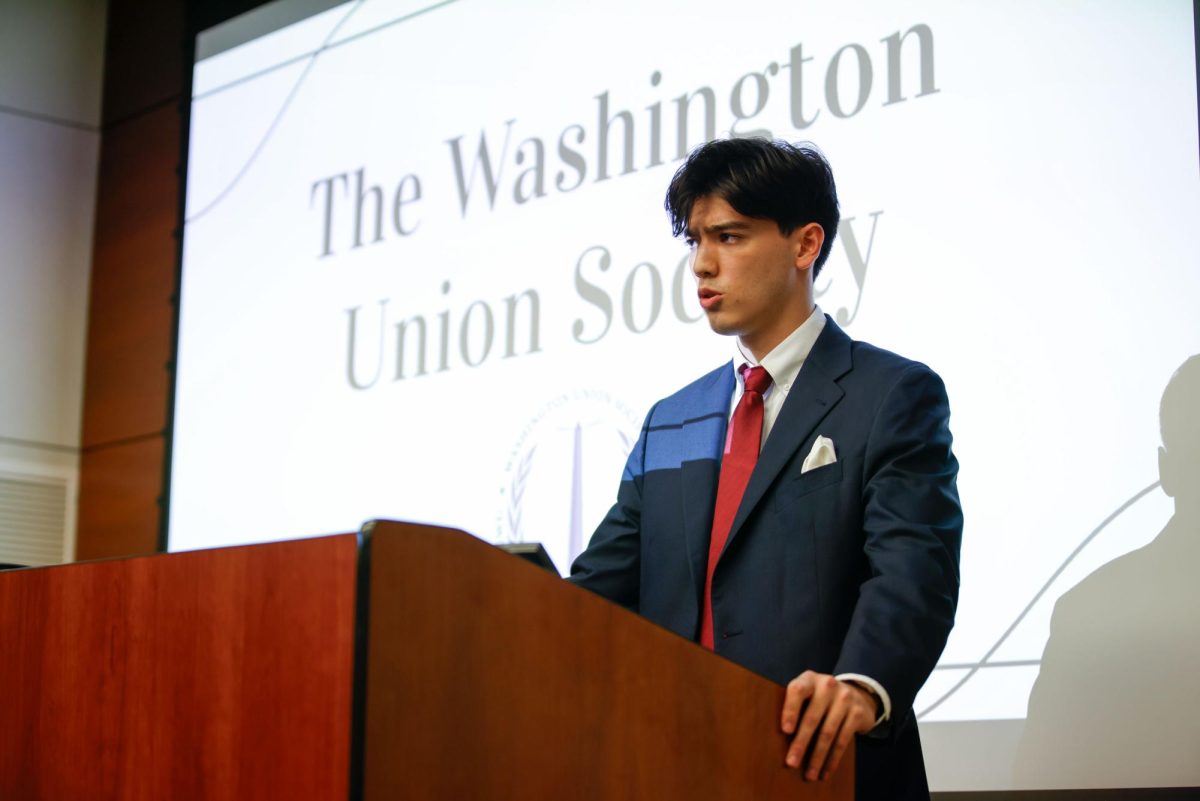A new campus debate club on Thursday discussed whether modern U.S. politics pose a threat to the republic in their inaugural debate at the School of Media & Public Affairs.
Pavel Oman, president of the Washington Union Society debate club, said officials approved the organization as a student organization last month after deferring their application last spring due to issues with their drafted constitution. Their first debate featured guest debater Mollie Hemingway, the editor in chief of The Federalist, and five student debaters who discussed the state of the American republic.
Oman said the WUS, which currently has 38 members, was started by the club’s vice president Anirudh Prasanna and himself. He said they were inspired by similar debate organizations at Oxford and Cambridge universities, who model their debate style off of “British parliamentary tradition.”
He said the organization plans to host events for students and other guests to debate the challenges “shaping our world” across politics, popular culture and academia.
“Our purpose is to provide a forum for free speech, debate and inquiry of the truths common and binding to us all,” Oman said.
Oman said the WUS is not only a forum for politics, but also a place for people to come and debate a wide range of topics including artificial intelligence and pop artists.
“We want to be something where people can talk about AI and science issues, economics, business issues, popular culture, art, yes, politics, but also fun things, like, ‘This house believes that Taylor Swift saved the American economy’ or ‘it’s better to fake it till you make it,’” Oman said.
Oman opened the event by thanking the executive board and debaters for participating, and explained the rules and structure of the debate. Debaters were given ten minutes to speak either for, against or in abstention to the matter during which they can be interrupted by a “point of information” from audience members.
“Motions are laid before the House, which are then debated by a series of speakers in support, in opposition and in abstention,” Oman said. “Those who have specifically designated time to speak are called paper speakers. Debates are comprised of 10 minute speeches from each speaker.”
Pavel ceded the podium to Hemingway to begin the debate over the statement, “this house believes our country is in danger.” Hemingway said there are many people in the United States that do not agree with key points made in the preamble of the Constitution, such as the existence of God and the fact that Americans’ rights are granted to them by God.
She pointed to the federal bureaucracy, which she described as a nonconstitutionally mandated fourth branch of government, as the reason why the American republic is in danger.
“We have literally hundreds of federal agencies and subagencies drafting and finalizing thousands of rules,” she said. “Each and every year, Congress has willingly turned over its authority to make the laws to these agencies, which are insulated from elections and accountability.”
The next debater, Austin O’Connell, took to the podium in opposition to the idea that the republic is in danger. He said America remains one of the world’s most “prosperous” countries in history and pointed toward the religious and political activists commonly seen on the GW campus.
“I, for one, find it remarkable and a testament to the greatness of this country that while walking to class, one can see a socialist and a street preacher right across from each other,” O’Connell said.
O’Connell said Americans have some of the highest standards of living in world history. He said the average American is “90 times richer” than the average “historical human.”
“Americans complain about income inequality, but two-thirds of our country is in the top 1 percent by global standards, even the bottom 5 percent of American earners are better off than 68 percent of the global population,” O’Connell said.
O’Connell said the U.S. is resilient, as it persisted through a revolutionary war, civil war and the Great Depression. He said the commitment of the students in the room to uphold America’s successes and fix its shortcomings is what makes him optimistic about the country’s survival past these tense times.
“Time and again, our institutions and democratic principles have demonstrated their resilience in the face of adversity,” O’Connell said. “I submit that we should be cautiously optimistic about the future of our republic.”





